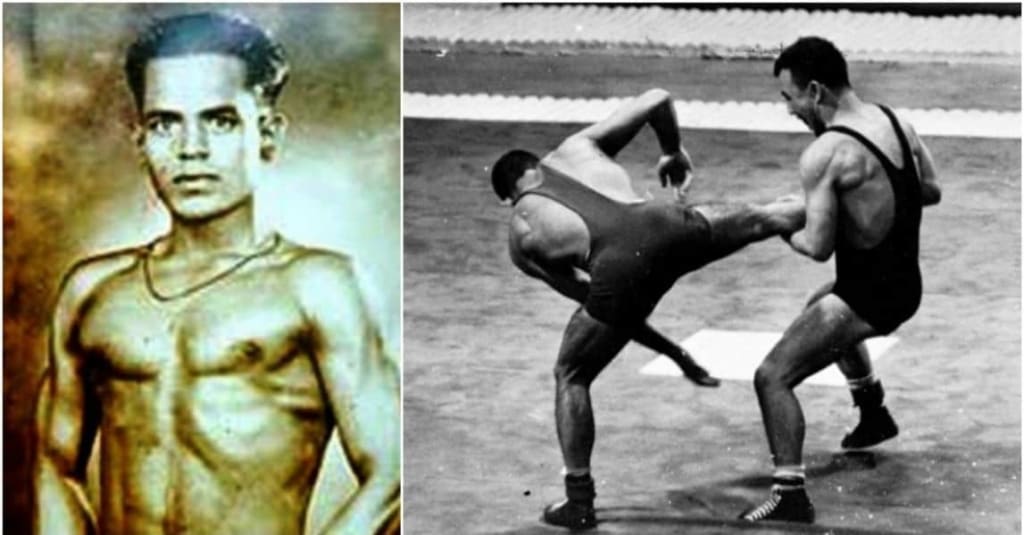The Pioneer of Indian Wrestling: Khashaba Dadasaheb Jadhav
Introduction, Early Life and Career, Olympic Success, Legacy and Impact, Conclusion

Introduction:
Khashaba Dadasaheb Jadhav, also known as "Pocket Dynamo," was a pioneering figure in Indian wrestling. He was born on January 1, 1926 in the village of Goleshwar in the Satara district of Maharashtra, India. He was the youngest of five siblings and came from a family of farmers.
Jadhav's passion for wrestling began at a young age, and he quickly made a name for himself in the sport. He trained under the guidance of his father, who was also a wrestler, and soon began competing in local and regional competitions. He represented India in the 1948 London Olympics, but due to lack of proper training facilities and support, he could not perform to his full potential.
In 1952, Jadhav was selected to represent India in the Helsinki Olympics. He competed in the Men's freestyle bantamweight category and won the bronze medal, becoming the first Indian wrestler to win an Olympic medal. This achievement brought him much recognition and accolades, and he became a national hero.
Jadhav continued to compete in wrestling until his retirement in 1957. After that, he worked as a coach and administrator in the field of wrestling. He was also appointed as the chief national coach for wrestling by the Indian Government. He died on August 14, 1984, but his legacy lives on as an inspiration for many young wrestlers in India.
Khashaba Dadasaheb Jadhav had a significant impact on Indian wrestling. He was a pioneering figure in the sport, who through his hard work, determination, and Olympic medal, helped to put Indian wrestling on the global map.
He was the first Indian wrestler to win an Olympic medal, which was a bronze in the Men's freestyle bantamweight category, in the 1952 Helsinki Olympics. This achievement brought him recognition and accolades and helped to inspire future generations of Indian wrestlers.
Jadhav's success at the Olympics helped to raise the profile of wrestling in India and encouraged more people to take up the sport. He also served as a role model for young Indian wrestlers, showing them that with hard work and dedication, they too could achieve great things.
After his retirement, Jadhav continued to work in the field of wrestling, serving as a coach and administrator. He was also appointed as the chief national coach for wrestling by the Indian Government, which helped to develop the sport in India.
Jadhav's legacy continues to live on, as he is remembered as one of the greatest Indian wrestlers of all time. His contributions to the sport have been recognized by the Indian government, which has honored him with several awards and accolades. His impact on Indian wrestling has been instrumental in shaping the sport and inspiring future generations of wrestlers.
Early Life and Career:
Khashaba Dadasaheb Jadhav was born on January 1, 1926 in the village of Goleshwar in the Satara district of Maharashtra, India. He was the youngest of five siblings and came from a family of farmers. Despite his humble beginnings, Jadhav was determined to make a name for himself in the world of wrestling.
Jadhav's passion for wrestling began at a young age and he began training under the guidance of his father, who was also a wrestler. His father was his first coach and mentor, who taught him the basics of the sport. He soon began competing in local and regional competitions and quickly made a name for himself as a talented wrestler.
Jadhav's early success in wrestling led him to represent India in the 1948 London Olympics. However, due to a lack of proper training facilities and support, he was not able to perform to his full potential.
Despite this setback, Jadhav did not let this discourage him and he continued to train hard and improve his skills. In 1952, he was selected to represent India in the Helsinki Olympics. He competed in the Men's freestyle bantamweight category and won the bronze medal, becoming the first Indian wrestler to win an Olympic medal. This achievement brought him much recognition and accolades, and he became a national hero.
Jadhav continued to compete in wrestling until his retirement in 1957. After that, he worked as a coach and administrator in the field of wrestling. He was also appointed as the chief national coach for wrestling by the Indian Government, which helped to develop the sport in India. His dedication, hard work, and determination helped pave the way for future generations of Indian wrestlers.
Olympic Success:
Khashaba Dadasaheb Jadhav participated in the 1952 Helsinki Olympics, where he represented India in the Men's freestyle bantamweight category. This was his second Olympic appearance, having previously competed in the 1948 London Olympics.
Jadhav's participation in the 1952 Olympics was a significant achievement, as it was not easy for Indian athletes to qualify for the Olympics during that time due to the lack of proper training facilities and support. Nevertheless, Jadhav's hard work and determination paid off, and he was able to secure a spot on the Indian Olympic team.
During the 1952 Olympics, Jadhav competed against some of the best wrestlers in the world and was able to make it to the semifinals. In the semifinals, he lost to the eventual gold medalist, but still managed to secure the bronze medal in the Men's freestyle bantamweight category, becoming the first Indian wrestler to win an Olympic medal.
Jadhav's achievement at the 1952 Olympics was a historic moment for Indian wrestling and brought him much recognition and accolades. His bronze medal win was a major accomplishment and helped to inspire future generations of Indian wrestlers to pursue their dreams and represent their country on the global stage.
Legacy and Impact:
Khashaba Dadasaheb Jadhav's legacy and impact on Indian wrestling is significant. He was a pioneering figure in the sport, who through his hard work, determination, and Olympic medal, helped to put Indian wrestling on the global map.
Jadhav's achievement of winning the bronze medal in the Men's freestyle bantamweight category at the 1952 Helsinki Olympics was a historic moment for Indian wrestling. It was the first Olympic medal for Indian wrestling, and it helped to raise the profile of the sport in India. His success at the Olympics inspired future generations of Indian wrestlers to pursue their dreams and represent their country on the global stage.
After his retirement, Jadhav continued to work in the field of wrestling, serving as a coach and administrator. He was also appointed as the chief national coach for wrestling by the Indian Government, which helped to develop the sport in India. His work as a coach helped to produce many talented wrestlers who went on to represent India in various international competitions.
Jadhav's legacy also lives on in the form of various awards and honors that have been bestowed upon him. The Indian government has honored him with several awards, including the Padma Shri in 1968 and the Arjuna Award in 1961, for his contributions to Indian wrestling.
Jadhav's impact on Indian wrestling has been instrumental in shaping the sport and inspiring future generations of wrestlers. His legacy continues to be remembered and celebrated in India, as one of the greatest Indian wrestlers of all time.
Conclusion:
In conclusion, Khashaba Dadasaheb Jadhav was a pioneering figure in Indian wrestling. He was born in a small village in Maharashtra and through hard work, determination, and perseverance, he became the first Indian wrestler to win an Olympic medal. His bronze medal win in the Men's freestyle bantamweight category at the 1952 Helsinki Olympics was a historic achievement that put Indian wrestling on the global map.
Jadhav's Olympic medal was not only an achievement for him but also for the whole country, as it inspired future generations of Indian wrestlers to pursue their dreams and represent their country on the global stage. He continued his work in the field of wrestling after his retirement as a coach and administrator, and also as chief national coach for wrestling appointed by the Indian government which helped to develop the sport in India.
Jadhav's legacy and impact on Indian wrestling is still remembered and celebrated in India, as one of the greatest Indian wrestlers of all time. His contributions to the sport have been recognized by the Indian government, which has honored him with several awards and accolades. His impact on Indian wrestling has been instrumental in shaping the sport and inspiring future generations of wrestlers.
About the Creator
Enjoyed the story? Support the Creator.
Subscribe for free to receive all their stories in your feed. You could also pledge your support or give them a one-off tip, letting them know you appreciate their work.






Comments
There are no comments for this story
Be the first to respond and start the conversation.